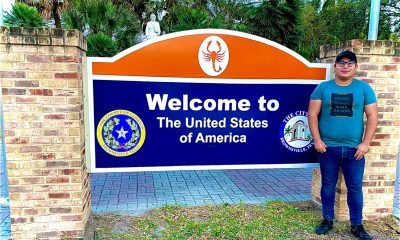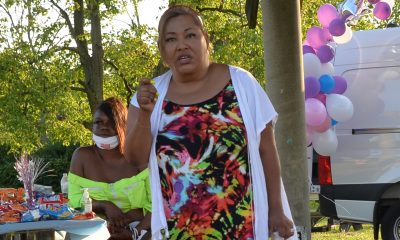News
Victory Institute organiza talleres en Centroamérica
Nicaragüenses están entre los participantes
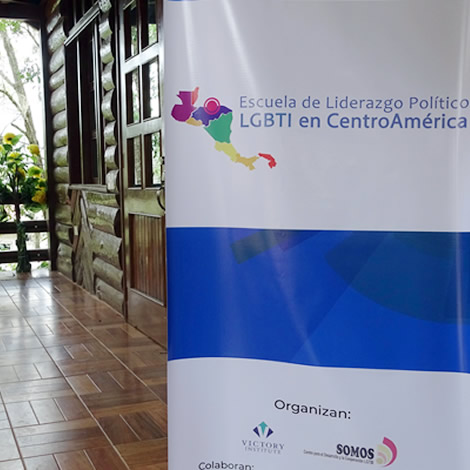
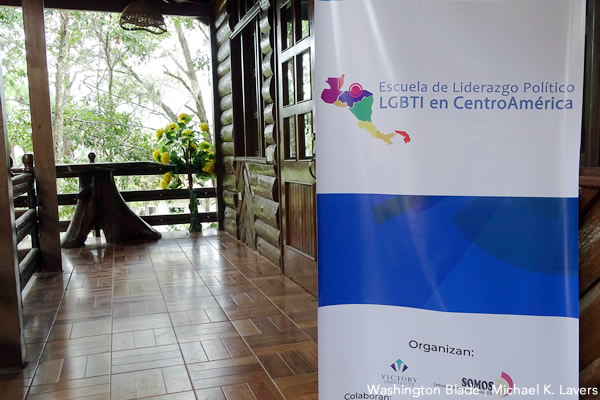
El LGBTQ Victory Institute ha organizado una serie de talleres en Centroamérica para promover la participación de la comunidad LGBTI en el proceso político de la región. Se realizó el primer taller fuera de la capital hondureña de Tegucigalpa el 28-30 de septiembre de 2018. (Foto del Washington Blade por Michael K. Lavers)
Un grupo de nicaragüenses que están participando en protestas contra del gobierno de su país estaban entre las 28 personas que asistieron al primer taller que se realizó fuera de la capital hondureña de Tegucigalpa entre el 28 y 30 de septiembre.
Un segundo taller que enfocará en las instituciones gubernamentales, la política y la oratoria se realizará en la Ciudad de Guatemala el 26-28 de octubre. Dos talleres adicionales que enfocará en la gestión de campañas electorales, la seguridad personal y el refuerzo de la participación LGBTI en el proceso político se espera realizarse en Honduras y Guatemala el próximo mes y en enero.
Los talleres son parte de la Escuela de Liderazgo Político LGBTI en Centroamérica.
Participantes vienen de Honduras, Guatemala, El Salvador y Nicaragua. SOMOS CDC, la Asociación Lambda y Caribe Afirmativo — tres grupos LGBTI de Honduras, Guatemala y Colombia respectivamente — organizaron a los talleres con el Victory Institute.
“Más y más lideres LGBTQ se están preparando y postulando para la oficina en Honduras y por Centroamérica — y nuestra Escuela de Liderazgo Político LGBTI tiene como objetivo proporcionarles las herramientas, habilidades y redes necesarias para ganar,” Ruben Gonzales, vice presidente del Victory Institute, dijo al Washington Blade en una declaración. “En los últimos años, nuestros participantes y socios en Honduras y la región se han vuelto cada vez más audaces y estratégicos, aprovechando las oportunidades para seguir carreras en el servicio público y transformar los partidos políticos desde adentro.”
La discriminación y la violencia basada en la orientación sexual y la identidad de género siguen siendo generalizadas en Honduras, El Salvador y Guatemala. Los informes indican más de 500 personas han sido asesinadas en Nicaragua desde el comienzo de las protestas contra del gobierno del presidente Daniel Ortega y su esposa, la vicepresidenta Rosario Murillo, el 18 de abril.
A pesar de estas amenazas, varias personas abiertamente LGBTI se han postulado para cargos públicos en la región.
Sandra Morán, que es una mujer lesbiana, es la primera persona LGBTI elegida al Congreso de Guatemala. Ella asumió su cargo el 14 de enero de 2016.
Erick Martínez era uno de cuatro candidatos abiertamente LGBTI que sin éxito corrió por un escaño en el Congreso de Honduras en 2012. Claudia Spellman y Victoria Gómez — dos mujeres abiertamente trans también era candidatas congresionales en 2012 — fueron amenazadas o atacadas y ahora viven fuera de Honduras.
Martínez corrió otra vez por el Congreso de Honduras en 2017, pero perdió.
Kendra Stefani Jordany en marzo de 2017 se convirtió en la primera persona abiertamente trans de ganar una elección primaría en Honduras cuando estuvo entre los candidatos del Parlamento Centroamericano que avanzaron a las elecciones generales del país que se celebraron el pasado noviembre. Jordany y Rihanna Ferrara, otra mujer abiertamente trans que era candidata por el Congreso de Honduras, perdieron sus respectivas elecciones.
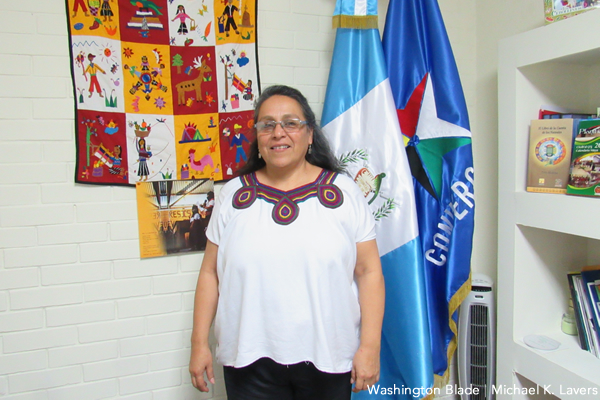
Sandra Morán es la primera persona abiertamente LGBTI elegida al Congreso de Guatemala. (Foto del Washington Blade por Michael K. Lavers)
Alex Peña, un hombre abiertamente trans de El Salvador que fue atacado por policías en 2015, era candidato por el Consejo Municipal de San Salvador a principios de este año. Peña no gaño, pero dijo al Blade durante una entrevista en la capital salvadoreña después de la elección del 4 de marzo que “es un derecho que tenemos que ser parte de esa.”
“El crecimiento de la participación política (de la comunidad LGBTI) es clave para asegurar la igualdad en Centroamérica, y los líderes que asistan a nuestra escuela están a la vanguardia de hacer de esto una realidad,” dijo Gonzales.
Activistas en Colombia, la República Dominica y otros países han trabajado con el Victory Institute para promover la participación de la comunidad LGBTI en el proceso político. Se realiza cada diciembre en Washington la Conferencia Internacional de Líderes LGBTQ del Victory Institute.
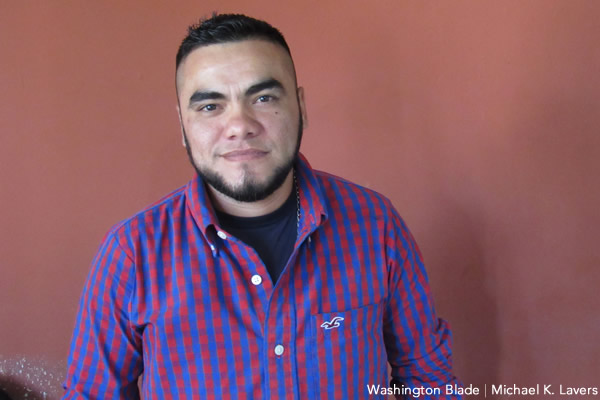
Alex Peña es un hombre trans que era candidato por el Consejo Municipal de San Salvador (El Salvador) en 2018. (Foto del Washington Blade por Michael K. Lavers)
Federal Government
Lambda Legal praises Biden-Harris administration’s finalized Title IX regulations
New rules to take effect Aug. 1

The Biden-Harris administration’s revised Title IX policy “protects LGBTQ+ students from discrimination and other abuse,” Lambda Legal said in a statement praising the U.S. Department of Education’s issuance of the final rule on Friday.
Slated to take effect on Aug. 1, the new regulations constitute an expansion of the 1972 Title IX civil rights law, which prohibits sex-based discrimination in education programs that receive federal funding.
Pursuant to the U.S. Supreme Court’s ruling in the landmark 2020 Bostock v. Clayton County case, the department’s revised policy clarifies that discrimination on the basis of sexual orientation and gender identity constitutes sex-based discrimination as defined under the law.
“These regulations make it crystal clear that everyone can access schools that are safe, welcoming and that respect their rights,” Education Secretary Miguel Cardona said during a call with reporters on Thursday.
While the new rule does not provide guidance on whether schools must allow transgender students to play on sports teams corresponding with their gender identity to comply with Title IX, the question is addressed in a separate rule proposed by the agency in April.
The administration’s new policy also reverses some Trump-era Title IX rules governing how schools must respond to reports of sexual harassment and sexual assault, which were widely seen as imbalanced in favor of the accused.
Jennifer Klein, the director of the White House Gender Policy Council, said during Thursday’s call that the department sought to strike a balance with respect to these issues, “reaffirming our longstanding commitment to fundamental fairness.”
“We applaud the Biden administration’s action to rescind the legally unsound, cruel, and dangerous sexual harassment and assault rule of the previous administration,” Lambda Legal Nonbinary and Transgender Rights Project Director Sasha Buchert said in the group’s statement on Friday.
“Today’s rule instead appropriately underscores that Title IX’s civil rights protections clearly cover LGBTQ+ students, as well as survivors and pregnant and parenting students across race and gender identity,” she said. “Schools must be places where students can learn and thrive free of harassment, discrimination, and other abuse.”
Maryland
Rockville teen charged with plotting school shooting after FBI finds ‘manifesto’
Alex Ye charged with threats of mass violence

BY BRETT BARROUQUERE | A Montgomery County high school student is charged with what police describe as plans to commit a school shooting.
Andrea Ye, 18, of Rockville, whose preferred name is Alex Ye, is charged with threats of mass violence. Montgomery County Police and the FBI arrested Ye Wednesday.
The rest of this article can be found on the Baltimore Banner’s website.
Politics
Survey finds support for Biden among LGBTQ adults persists despite misgivings
Data for Progress previewed the results exclusively with the Blade

A new survey by Data for Progress found LGBTQ adults overwhelmingly favor President Joe Biden and Democrats over his 2024 rival former President Donald Trump and Republicans, but responses to other questions may signal potential headwinds for Biden’s reelection campaign.
The organization shared the findings of its poll, which included 873 respondents from across the country including an oversample of transgender adults, exclusively with the Washington Blade on Thursday.
Despite the clear margin of support for the president, with only 22 percent of respondents reporting that they have a very favorable or somewhat favorable opinion of Trump, answers were more mixed when it came to assessments of Biden’s performance over the past four years and his party’s record of protecting queer and trans Americans.
Forty-five percent of respondents said the Biden-Harris administration has performed better than they expected, while 47 percent said the administration’s record has been worse than they anticipated. A greater margin of trans adults in the survey — 52 vs. 37 percent — said their expectations were not met.
Seventy precent of all LGBTQ respondents and 81 percent of those who identify as trans said the Democratic Party should be doing more for queer and trans folks, while just 24 percent of all survey participants and 17 percent of trans participants agreed the party is already doing enough.
With respect to the issues respondents care about the most when deciding between the candidates on their ballots, LGBTQ issues were second only to the economy, eclipsing other considerations like abortion and threats to democracy.
These answers may reflect heightened fear and anxiety among LGBTQ adults as a consequence of the dramatic uptick over the past few years in rhetorical, legislative, and violent bias-motivated attacks against the community, especially targeting queer and trans folks.
The survey found that while LGBTQ adults are highly motivated to vote in November, there are signs of ennui. For example, enthusiasm was substantially lower among those aged 18 to 24 and 25 to 39 compared with adults 40 and older. And a plurality of younger LGBTQ respondents said they believe that neither of the country’s two major political parties care about them.
-

 Africa4 days ago
Africa4 days agoCongolese lawmaker introduces anti-homosexuality bill
-

 District of Columbia1 day ago
District of Columbia1 day agoReenactment of first gay rights picket at White House draws interest of tourists
-

 World4 days ago
World4 days agoOut in the World: LGBTQ news from Europe and Asia
-

 Arizona1 day ago
Arizona1 day agoAriz. governor vetoes anti-transgender, Ten Commandments bill

